Key takeaways:
- Understanding child safeguarding is complex, requiring awareness of various risks and the importance of listening to children’s experiences.
- Staying informed on evolving policies is crucial for effective advocacy and protecting vulnerable children.
- Engaging with advocacy groups and attending workshops enhances knowledge, builds networks, and empowers individuals to influence child safeguarding policies.
- Reflecting on personal learning journeys fosters deeper understanding and emotional connection to child safeguarding issues.
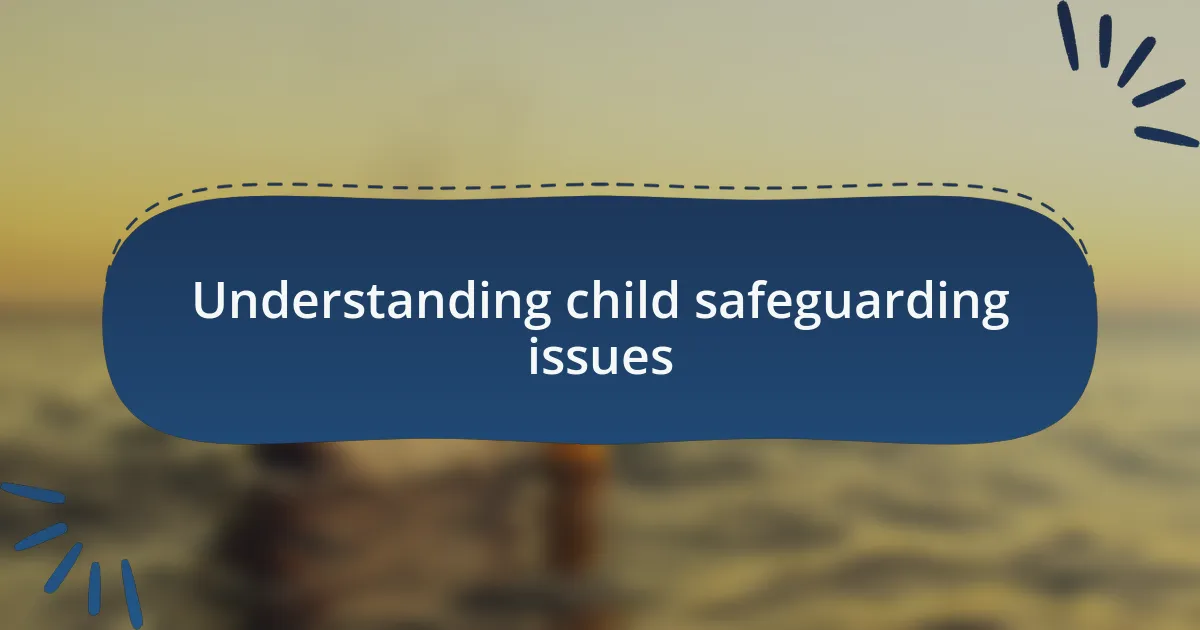
Understanding child safeguarding issues
Understanding child safeguarding issues requires looking at the nuances of child development and the specific risks children face. I remember my first workshop on child safeguarding; it struck me how many factors—like neglect or abuse—can significantly impact a child’s emotional and physical well-being. Have you considered how something as seemingly minor as a failure to provide basic emotional support can have long-term repercussions?
As I dove deeper into the topic, I often found myself reflecting on the stories shared by those working directly with children. One case involved a child whose voice went unheard for years, highlighting the critical importance of listening to their experiences. How many more children fall under the radar simply because their struggles don’t manifest in obvious ways?
Moreover, being informed about cultural sensitivities surrounding child safeguarding has been eye-opening. I once attended a seminar where different cultural practices concerning discipline were discussed, and it left me wondering: how can we ensure that safeguarding measures respect cultural contexts while prioritizing a child’s safety? Understanding this intersection is crucial for effective advocacy in this field.
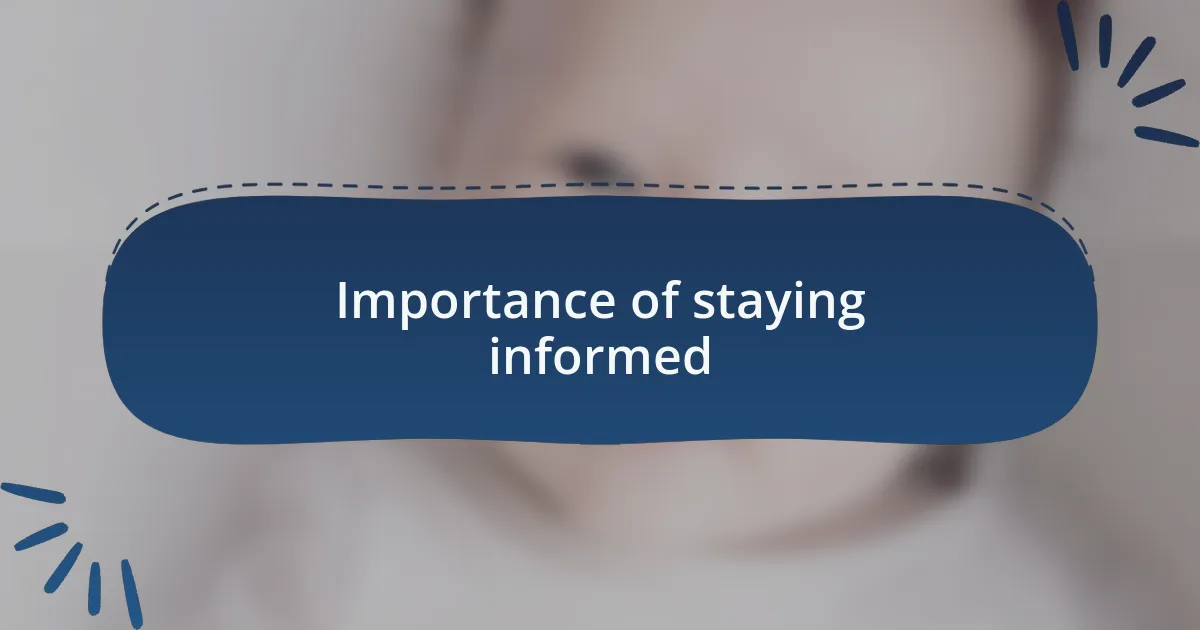
Importance of staying informed
Staying informed on policy issues in child safeguarding isn’t just beneficial—it’s vital. I recall attending a community meeting where local policies were discussed, and it became clear that many parents were unaware of their rights and the resources available to them. How can we advocate for children if we don’t even understand the policies that affect them? It’s this very lack of awareness that can leave vulnerable children at risk.
In my experience, I’ve noticed how policies constantly evolve, reflecting new understandings of child welfare. I once missed a critical change regarding online safety regulations due to insufficient research. That lapse affected my advocacy work and made me realize that being informed is not a choice but a responsibility. If we don’t stay updated, we risk losing the opportunity to protect the very children we aim to serve.
I find it particularly alarming how misinformation can spread rapidly among communities. For instance, at a recent workshop, someone confidently shared a falsehood regarding reporting procedures. This misstep reminded me how essential it is not only to stay informed but also to share accurate information with others. After all, if we stumble on the details, how can we help ensure a safer environment for children?
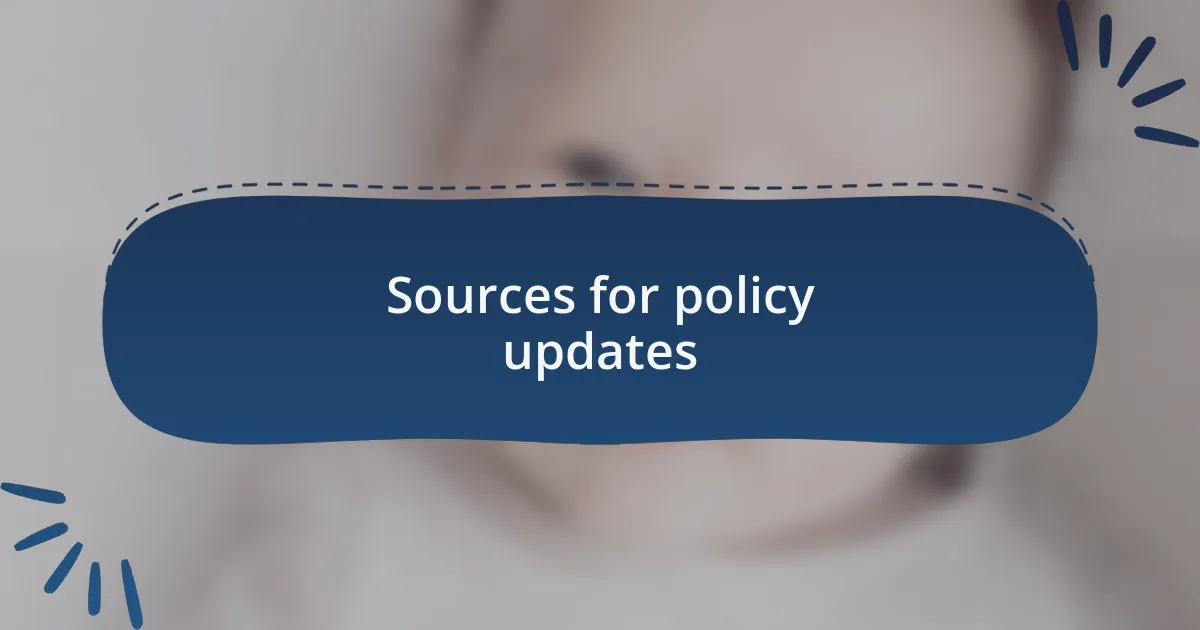
Sources for policy updates
Staying updated on policy issues requires me to tap into reliable sources that provide trustworthy information. I often find myself browsing government websites and reputable NGOs dedicated to child safeguarding. They frequently publish updates and analyses that are beneficial for understanding the implications of new legislation. Wouldn’t it be reassuring to know that what you’re reading comes from experts who specialize in child welfare?
In my journey to stay informed, I also rely on newsletters from advocacy groups. A few months ago, I signed up for alerts from a local child welfare organization, and it has been a game-changer. The insights I receive, particularly around emerging issues, keep me engaged and informed. It’s like having a personal guide through the often-unclear landscape of child safeguarding policies.
Social media platforms can serve as an unexpected yet valuable tool for real-time updates. When a colleague shared a tweet about a proposed policy change, I felt the urgency to dive deeper. That immediate access to information not only inspired my advocacy efforts but made me recognize how interconnected we can be. Don’t you think the speed at which we can access vital updates can empower us to take action?
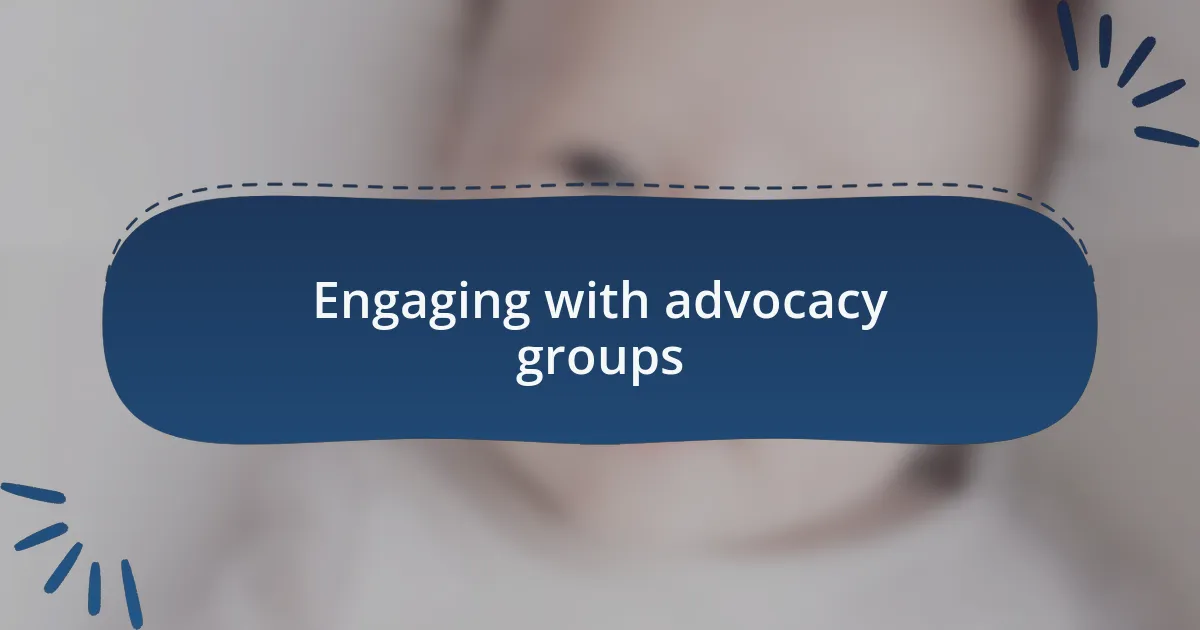
Engaging with advocacy groups
Engaging with advocacy groups has been a pivotal aspect of my journey in understanding policy issues related to child safeguarding. I remember attending a local advocacy meeting where passionate individuals shared their personal stories and insights. That experience solidified my belief in the power of community—the connection we all felt reminded me that we’re not alone in this fight for children’s rights. Isn’t it inspiring to realize that so many voices can come together to create significant change?
One of the most rewarding moments has been participating in collaborative campaigns. For instance, I teamed up with a grassroots organization to raise awareness about a critical child protection bill. The energy in those meetings was incredibly motivating, as we brainstormed strategies and shared our hopes. This hands-on involvement not only deepened my understanding of the policy implications but also fostered a sense of belonging. How often do we find ourselves connected to a cause that resonates deeply within us?
Moreover, advocacy groups often provide training sessions that are both informative and empowering. I recall attending a workshop focusing on effective lobbying techniques. I left feeling more equipped and confident to influence policymakers. It really opened my eyes to the impact we can make when we arm ourselves with the right knowledge. Don’t you think that when we engage this way, we not only become advocates but also active participants in shaping a safer future for children?
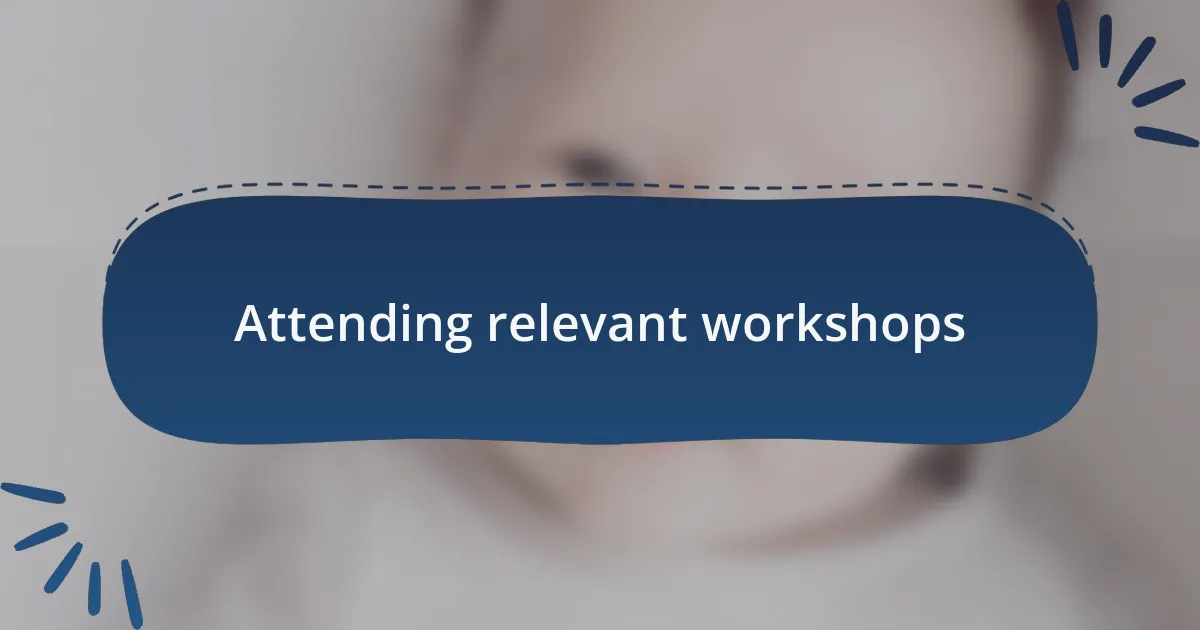
Attending relevant workshops
Attending workshops has been instrumental in enhancing my understanding of child safeguarding policies. I still recall one particular workshop where experts discussed recent legal changes affecting child welfare. The discussions were so dynamic that I found myself hanging on every word, realizing how intertwined policy decisions are with real-life ramifications for children. Have you ever felt that spark of realization when something just clicks?
The hands-on activities during these workshops are particularly memorable. I once participated in a group exercise where we simulated a policy advocacy scenario. It was both exciting and nerve-wracking to present our points in front of a panel of seasoned professionals. That experience not only boosted my confidence but also reaffirmed the importance of being well-versed in policy issues. Isn’t it true that practice often makes us more prepared for the real challenges we will face?
Beyond learning about policies, workshops are also about building networks with like-minded individuals. I found friendships with fellow participants who share the same passion for child safeguarding. These connections have proven invaluable as we exchange resources and support each other in our advocacy efforts. Have you thought about how powerful it can be to work alongside others who share your vision?
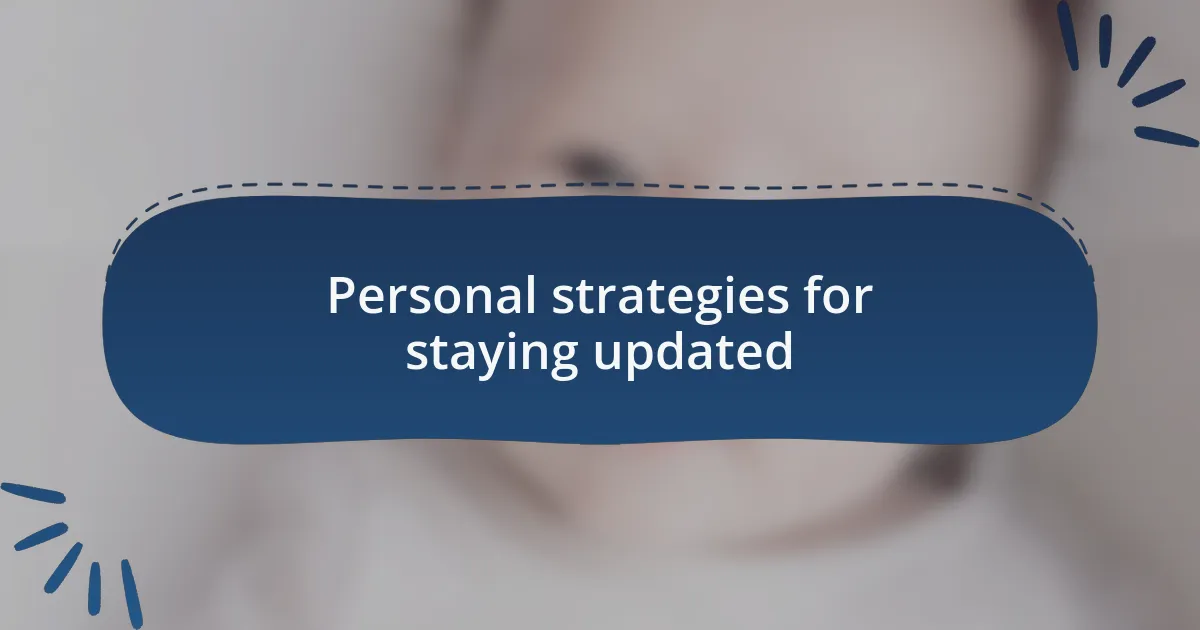
Personal strategies for staying updated
One of my go-to strategies for staying updated is subscribing to relevant newsletters. I remember signing up for a weekly digest from a child safeguarding organization, and it felt like I had a direct line to the latest news and research. Each time I open my inbox, I find insights that keep my passion ignited. Have you ever stumbled upon a piece of information that changed how you viewed a situation? I certainly have, and it’s amazing how the right resource at the right time can stir that sense of urgency to act.
Another approach I use is dedicating time for browsing credible websites and online forums. I often spend late evenings sifting through discussion threads where professionals share their insights. One night, I came across a passionate debate on a recent policy change, and reading the differing perspectives was eye-opening. It made me think about how diverse experiences shape our understanding of issues. Do you engage in conversations where viewpoints clash? These debates can sometimes lead to profound realizations.
Lastly, I find that engaging with social media groups focused on child safeguarding is essential in my strategy. I’ve joined several platforms where advocates passionately share updates and resources. One discussion about a state-level policy proposal ignited a flurry of comments, each coming from a personal place. It reminded me that while policies might seem distant, they are profoundly personal for many. How do you connect with others in this field? Just knowing we’re all navigating these waters together can be incredibly empowering.
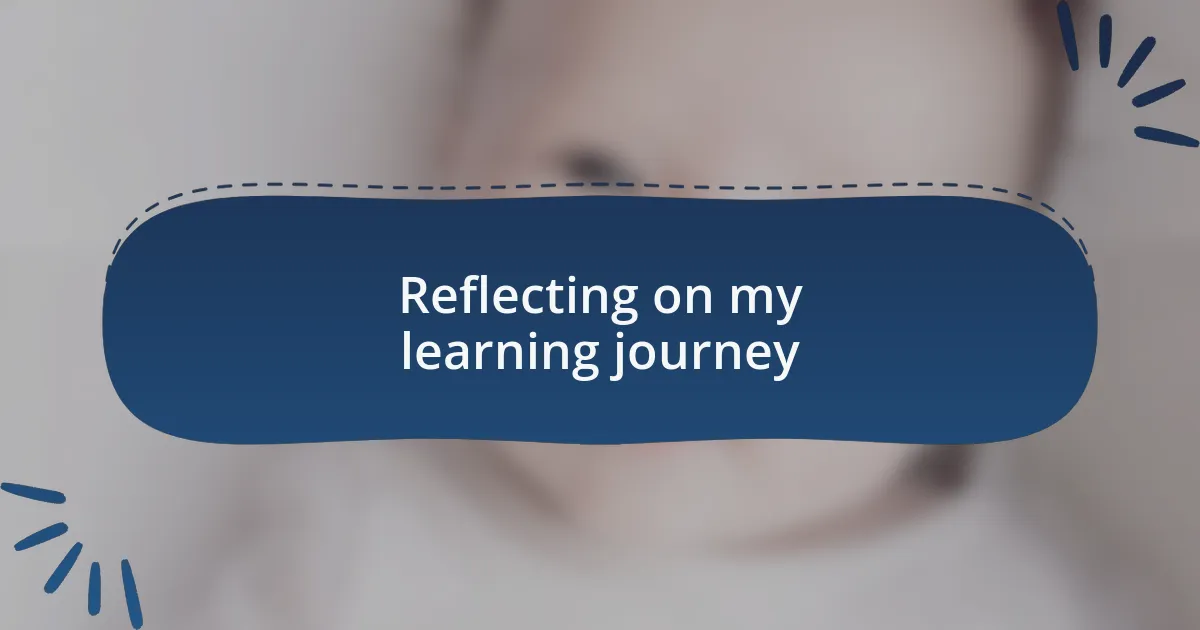
Reflecting on my learning journey
Reflecting on my learning journey has led me to appreciate the importance of active engagement. I recall a conference I attended where a panel discussed trauma-informed approaches in child safeguarding. Listening to experts share their experiences was transformative; it made me realize how much I still had to learn. Have you ever felt that rush of motivation after gaining new insights from someone else’s story? I certainly did that day.
Throughout my journey, I made it a point to document my reflections regularly. Keeping a journal helped me capture not just facts, but feelings and questions that arose as I delved into different topics. For instance, I often wrote about the challenges I encountered when trying to understand the implications of certain policies. This practice not only deepened my understanding but also created a personal narrative of growth. Isn’t it fascinating how writing can crystallize our thoughts and shape our learning?
One poignant moment stands out from my experiences: discussing a personal loss related to a safeguarding issue with a close colleague. As we shared our experiences, I felt an overwhelming sense of solidarity. It reinforced that learning in this field is not just about digesting information—it’s about connecting on a human level. How often do we stop to consider the emotional weight behind the policies we study? Recognizing this makes the journey even more significant.